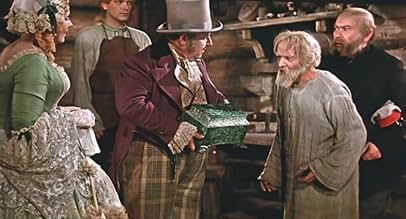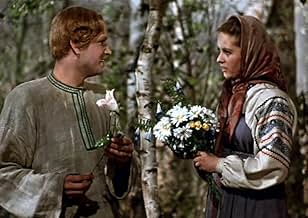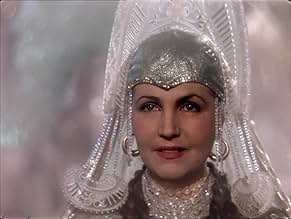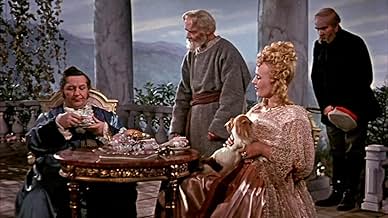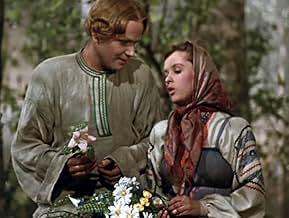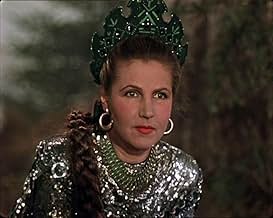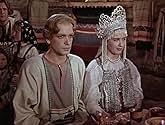IMDb-BEWERTUNG
7,1/10
558
IHRE BEWERTUNG
Füge eine Handlung in deiner Sprache hinzuObsessed with perfecting his craft, young gemcutter Danilo visits the mystical Copper Mountain to uncover the secret behind its infamous attraction - the Stone Flower, a stone carving so cap... Alles lesenObsessed with perfecting his craft, young gemcutter Danilo visits the mystical Copper Mountain to uncover the secret behind its infamous attraction - the Stone Flower, a stone carving so captivating that no one can leave after seeing it.Obsessed with perfecting his craft, young gemcutter Danilo visits the mystical Copper Mountain to uncover the secret behind its infamous attraction - the Stone Flower, a stone carving so captivating that no one can leave after seeing it.
- Regie
- Drehbuch
- Hauptbesetzung
- Auszeichnungen
- 2 Gewinne & 2 Nominierungen insgesamt
Vladimir Druzhnikov
- Danilo - master
- (as V. Druzhnikov)
Yekaterina Derevshchikova
- Katya
- (as Y. Derevshchikova)
Mikhail Troyanovskiy
- Prokopych
- (as M. Troyanovsky)
Mikhail Yanshin
- Severyan
- (as M. Yanshin)
Nikolay Temyakov
- Barin
- (as N. Temyakov)
Anna Petukhova
- Barina
- (as A. Petukhova)
Nikolai Orlov
- Stary master
- (as N. Orlov)
Lidiya Deikun
- Vikhorika
- (as L. Deikun)
Serafim Zaytsev
- Yefimka
- (as S. Zaytsev)
Vitaliy Kravchenko
- Danilo - malchyk
- (as V. Kravchenko)
Empfohlene Bewertungen
An old man recounts a fairy-tale to a group of children about a stone-cutter, "Danila", who strives for perfection and meets with the mystical "Queen of Copper Hill". She asks him to sacrifice himself and remain with her in her unreachable world of stone at the expense of his married life with "Katinka", the girl he loves and whom he has just married.
The film is made in colour which is refreshing for 1946 and it is 15 minutes longer than described on IMDb. However, the story drags. The Russian hierarchy is very effectively captured - we witness the cruelties of the ruling classes who take to flogging the poor. They don't just flog them, they beat them to death for not working hard enough or not finishing a piece of work in time. Danila's talent at stone sculpture results in him being commissioned to make a piece for a wealthy landowner who wants to show off. However, the "Queen of Copper Hill" intervenes. It takes ages for this part of the story to get going, though.
Vladimir Druzhnikov is good in the lead role as "Danila". He looks a bit gay and girlie and very much suits the artistic type that is required for the film. The sets within the world of stone in Copper Hill are interesting in a "Star Trek" kind of way but each section of the film just seems to drag on for too long. Apart from the dance sequence in the wedding episode - one of the more entertaining parts of the film.
I also felt that the ending of the film could have been better. It's a happy-ending story but it would have been far more effective as a tragedy. We are led to believe that the Queen of Copper Hill has an evil sacrifice up her sleeve and that someone is going to get turned to stone for eternity. This is exactly what the film needs. But it doesn't happen. She suddenly switches to a goodie and we get a "love conquers all" message which is a disappointment. The film keeps you watching with false expectations and I felt cheated at the end. The rules suddenly change from "You can never go back!" to "Ok you can go back now". Very lame. The film needed an effective finale, ie, some tragedy, to redeem the rest of the tedious film but it didn't happen. It scores for novelty value only.
The film is made in colour which is refreshing for 1946 and it is 15 minutes longer than described on IMDb. However, the story drags. The Russian hierarchy is very effectively captured - we witness the cruelties of the ruling classes who take to flogging the poor. They don't just flog them, they beat them to death for not working hard enough or not finishing a piece of work in time. Danila's talent at stone sculpture results in him being commissioned to make a piece for a wealthy landowner who wants to show off. However, the "Queen of Copper Hill" intervenes. It takes ages for this part of the story to get going, though.
Vladimir Druzhnikov is good in the lead role as "Danila". He looks a bit gay and girlie and very much suits the artistic type that is required for the film. The sets within the world of stone in Copper Hill are interesting in a "Star Trek" kind of way but each section of the film just seems to drag on for too long. Apart from the dance sequence in the wedding episode - one of the more entertaining parts of the film.
I also felt that the ending of the film could have been better. It's a happy-ending story but it would have been far more effective as a tragedy. We are led to believe that the Queen of Copper Hill has an evil sacrifice up her sleeve and that someone is going to get turned to stone for eternity. This is exactly what the film needs. But it doesn't happen. She suddenly switches to a goodie and we get a "love conquers all" message which is a disappointment. The film keeps you watching with false expectations and I felt cheated at the end. The rules suddenly change from "You can never go back!" to "Ok you can go back now". Very lame. The film needed an effective finale, ie, some tragedy, to redeem the rest of the tedious film but it didn't happen. It scores for novelty value only.
I saw The Stone Flower as somebody who really liked some of Aleksandr Ptusko's other films like Ruslan and Ludmilla, Sampo and Sadko(which is only to be seen in the original Russian version, the dub ruins it), and is having a great run of Russian fairy/folk-tale films. It was also highly recommended by commentators for those respective films, regarding it as one of his best/one of their favourites of his. I am happy that there are people who remember The Stone Flower very fondly, I am one of those newly-acquainted with it from Youtube rather than those who saw it in childhood. I am also glad that I saw it, as it really is as good as people say it is, and for me it is one of Ptushko's best. It is a gorgeous film to look at, the scenery is enough to take your breath away and the film is beautifully shot as well. It is very easy to be taken by the music score as well, because it does have a sense of fantasy and adventure, it sounds very Russian in its songs and its nationalistic feel, it is lusciously orchestrated and sometimes even sounds like a tender tone poem. The dialogue is well-incorporated within the story and sounds generally natural and sincerely delivered. The story is a magical one, it unfolds beautifully and packs a very powerful punch. It does move slowly particularly in the middle, but that is not a bad thing, if anything it gave the story a sense of freedom, time to breathe and allowed us to become invested in the characters and story and also admire the Russian culture. The characters all engage, especially the wicked Copper witch, they are fairy-tale clichés certainly but that is not to be taken as a bad thing. The acting is good, the hero is noble and sincere and the Copper Witch is both entrancing and icy. I personally didn't see the ending as that much of a cheat, there have been far worse ending cheats around. Though I do think also that The Stone Flower perhaps could've been even more powerful if ended tragically. All in all, magical. 10/10 Bethany Cox
The art direction and production design in the movie is really quite fetching. The physical film that was accordingly used to shoot 'The stone flower' resulted in rich, vibrant colors that allow every little trait to pop out brilliantly. Wonderful attention to hair, makeup, costume design, and set design and decoration, and every nuance of the cast's performances, is realized with inspiring vividness. Moreover, director Aleksandr Ptushko demonstrates a keen eye for arranging some fine shots, solid camerawork, and good care for lighting. And these are only just the visual aspects of what is an engaging, charming interpretation of a folk tale.
All the assembled actors put on fine displays of their skills to bring the picture to life, with Vladimir Druzhnikov especially notable as protagonist Danilo - believably portraying the young man's resolve, and obsession. Yet to discuss such facets at greater length seems unimportant when above all they serve simply as a component of the whole. It's the writing and direction that makes 'The stone flower' the entertaining classic that it is. Characters generally aren't written with especial depth, but like the acting, they work to complete the tableau. So it is too with the dialogue, very much feeling like the living communication of the sort of story that would be passed down over years - in no few ways a fable about the folly of pride, and ambition. And with that said, the fantastical scene writing and overall narrative are the greatest treasures here: terrifically entrancing, flush with detail and careful consideration, and enriching the entirety of the feature in their excellence. Druzhnikov matches the grand screenplay with adept focus and dexterity, tying the picture together with marvelous, expert finesse.
Factor in winsome set pieces, modest but suitable special effects - on par with any of the era - and gratifying instances of deftly arranged song and dance, and 'The stone flower' quite feels like it could be an early live-action production of Walt Disney's imagination. It's superb in its craft, and pleasantly endearing - really just an all-around lovely slice of cinema. If I have any specific criticism to make, it may perhaps be that the pacing struggles early on to find its footing. Yet for as splendidly well as the film is made, what slight deficiencies do crop up are negligible, and not truly significant. This is a magically, quietly engrossing movie, appropriate for all ages, that I think is surely very enjoyable for any viewer receptive to the type of story that it relates. I'd have no qualms recommending this to just about anyone - 'The stone flower' is a lot more fun, satisfying, and even rewarding than I thought it was going to be, and this is well worth checking out if you have the opportunity!
All the assembled actors put on fine displays of their skills to bring the picture to life, with Vladimir Druzhnikov especially notable as protagonist Danilo - believably portraying the young man's resolve, and obsession. Yet to discuss such facets at greater length seems unimportant when above all they serve simply as a component of the whole. It's the writing and direction that makes 'The stone flower' the entertaining classic that it is. Characters generally aren't written with especial depth, but like the acting, they work to complete the tableau. So it is too with the dialogue, very much feeling like the living communication of the sort of story that would be passed down over years - in no few ways a fable about the folly of pride, and ambition. And with that said, the fantastical scene writing and overall narrative are the greatest treasures here: terrifically entrancing, flush with detail and careful consideration, and enriching the entirety of the feature in their excellence. Druzhnikov matches the grand screenplay with adept focus and dexterity, tying the picture together with marvelous, expert finesse.
Factor in winsome set pieces, modest but suitable special effects - on par with any of the era - and gratifying instances of deftly arranged song and dance, and 'The stone flower' quite feels like it could be an early live-action production of Walt Disney's imagination. It's superb in its craft, and pleasantly endearing - really just an all-around lovely slice of cinema. If I have any specific criticism to make, it may perhaps be that the pacing struggles early on to find its footing. Yet for as splendidly well as the film is made, what slight deficiencies do crop up are negligible, and not truly significant. This is a magically, quietly engrossing movie, appropriate for all ages, that I think is surely very enjoyable for any viewer receptive to the type of story that it relates. I'd have no qualms recommending this to just about anyone - 'The stone flower' is a lot more fun, satisfying, and even rewarding than I thought it was going to be, and this is well worth checking out if you have the opportunity!
Seen shortly after it was released. A beautiful, and apparently rare film, since I have never seen a video of it available. Easily equal to the work of Serge Eisenstein, produced during the Stalinist days of the USSR, but is a telling of a famous Russian fable. An excellent film, which should be on video.
So says the grizzled old factory watchman at the conclusion of the folk tale he's been telling the children huddled around his fire through the Russian night. One of the young boys comes quietly up to him as the others leave, and tells him that he too wants to be a master-stoneworker, like the hero of the story: "ah!", says the watchman, "you got the point!" And the point's not just for children, either.
Ptushko's memorably beautiful film makes for a gripping parable about the conflict between the inner and outer life of the born artist, willing to risk sacrificing everything - even the woman he loves - in pursuit of artistic and technical perfection. At the secret heart of the Copper Witch's caverns, the Stone Flower itself represents that unattainable ideal of beauty, natural material fashioned so cunningly that it seems more real than reality itself. Danila, deeply unsatisfied with his work admired though it is by so many, has to study its form at any price, leaving his betrothal feast to pursue his ideal and hone his technique.
Will Danila break free of the Copper Witch's charms, and return to the "real world"? You'll have to watch the film to find out...
With only four significant characters - the young genius, the ageing and ailing master-craftsman who teaches (or is taught by) him, his faithful betrothed Katinka, and of course the Copper Witch herself - "Kamennyy tsvetok" is much more tightly structured and less riotously inventive than some of the other Ptuchko films I've been privileged to see, and the tension never flags.
Political content, too, is restrained - surprisingly so, given the film's date and the fact that it was (as other commentators have pointed out) the first major Russian film to be made in colour. The peasants are duly repressed by the fat and frivolous landowners and their brutal class-traitor henchmen, but (assuming that *my* brain has figured it out correctly!) the clear message is that whatever its conflicts with everyday life and relationships, art certainly transcends politics and class. Surprising indeed. There's even a moment in the beautifully depicted and choreographed folk betrothal where religious icons are bowed to with grace and reverence. It is amazing that Ptushko was daring enough to try to get that one past the censors, let alone manage to succeed!
The commentator who compared the visual feast on offer with Powell and Pressburger's roughly contemporary "The Red Shoes" was spot on: their "Tales of Hoffmann" is even closer in spirit. Ptushko's visual imagination and daring are in that league, and his colour process produced really breathtaking pictures. If his images here seem more illustrative and pictorial, less intrinsically filmic than the art of those English masters, they are none the less memorable. The magic scenes in the woods, and in the gem-sparkling caverns, are of a loveliness seldom matched in film of any era, and never surpassed.
The currently available RUSCICO DVD version is quite beautifully restored visually, and the sound is very acceptable too. With good extras, including a half-hour feature about Ptushko's life and work showcasing extracts from many of his other films, why not treat yourself and your family, if you have one, to this rich folk-tale? If you respond to it as I did, you may even manage - for one brief, shining moment - to feel that you are nine years old once again!
Ptushko's memorably beautiful film makes for a gripping parable about the conflict between the inner and outer life of the born artist, willing to risk sacrificing everything - even the woman he loves - in pursuit of artistic and technical perfection. At the secret heart of the Copper Witch's caverns, the Stone Flower itself represents that unattainable ideal of beauty, natural material fashioned so cunningly that it seems more real than reality itself. Danila, deeply unsatisfied with his work admired though it is by so many, has to study its form at any price, leaving his betrothal feast to pursue his ideal and hone his technique.
Will Danila break free of the Copper Witch's charms, and return to the "real world"? You'll have to watch the film to find out...
With only four significant characters - the young genius, the ageing and ailing master-craftsman who teaches (or is taught by) him, his faithful betrothed Katinka, and of course the Copper Witch herself - "Kamennyy tsvetok" is much more tightly structured and less riotously inventive than some of the other Ptuchko films I've been privileged to see, and the tension never flags.
Political content, too, is restrained - surprisingly so, given the film's date and the fact that it was (as other commentators have pointed out) the first major Russian film to be made in colour. The peasants are duly repressed by the fat and frivolous landowners and their brutal class-traitor henchmen, but (assuming that *my* brain has figured it out correctly!) the clear message is that whatever its conflicts with everyday life and relationships, art certainly transcends politics and class. Surprising indeed. There's even a moment in the beautifully depicted and choreographed folk betrothal where religious icons are bowed to with grace and reverence. It is amazing that Ptushko was daring enough to try to get that one past the censors, let alone manage to succeed!
The commentator who compared the visual feast on offer with Powell and Pressburger's roughly contemporary "The Red Shoes" was spot on: their "Tales of Hoffmann" is even closer in spirit. Ptushko's visual imagination and daring are in that league, and his colour process produced really breathtaking pictures. If his images here seem more illustrative and pictorial, less intrinsically filmic than the art of those English masters, they are none the less memorable. The magic scenes in the woods, and in the gem-sparkling caverns, are of a loveliness seldom matched in film of any era, and never surpassed.
The currently available RUSCICO DVD version is quite beautifully restored visually, and the sound is very acceptable too. With good extras, including a half-hour feature about Ptushko's life and work showcasing extracts from many of his other films, why not treat yourself and your family, if you have one, to this rich folk-tale? If you respond to it as I did, you may even manage - for one brief, shining moment - to feel that you are nine years old once again!
Wusstest du schon
- VerbindungenFeatured in Good Bye, Sowjetunion! (2021)
Top-Auswahl
Melde dich zum Bewerten an und greife auf die Watchlist für personalisierte Empfehlungen zu.
Details
- Laufzeit
- 1 Std. 29 Min.(89 min)
- Sound-Mix
- Seitenverhältnis
- 1.37 : 1
Zu dieser Seite beitragen
Bearbeitung vorschlagen oder fehlenden Inhalt hinzufügen

